The headline came across my Facebook feed: “Bear euthanized after ripping into tent, injuring mother & daughter.”
I didn’t need to read on to know what happened. But I did.
A bear wandered into the Elkmont Campground in the Great Smoky Mountains National Park early Sunday, entered a tent where a family of five slept, scratched a 3-year-old and her mom in the ensuing scuffle. (Both sustained superficial lacerations to their heads.) The father shooed the bear away, the authorities were notified, the bear was caught.
Why did the bear enter the tent? Because, of course, it smelled food inside, in this case, dog food.
 The 350-pound bear was determined to be “food-conditioned” — meaning it had become accustomed to eating human food — was deemed a threat and was euthanized. (You can read the entire story here.)
The 350-pound bear was determined to be “food-conditioned” — meaning it had become accustomed to eating human food — was deemed a threat and was euthanized. (You can read the entire story here.)
Black bears, the type of bear we have in the East, are not aggressive by nature. Unless you get between a mom and her cubs, a bear’s first reaction when it gets wind of you is to hightail it, cartoon style, and head the opposite direction. Every one of the seven bear encounters I’ve had have ended this way.
All it takes to live in harmony with our bruin buddies is a little common sense. And the best place to score some when it comes to bears is at bearwise.org, which offers tips for coexisting with bears, whether you’re a farmer, a homeowner in bear country, a dog walker or a camper. Today, we share their tips for camping in a bear’s domain.
- Keep a clean camp. Even the smallest scrap, from actual food to cooking gear to a used tea bag, can attract attention. Once at a backcountry campsite in South Mountains State Park I lazily left a new insulated mug out overnight. Next morning the cup’s shredded insulation was scattered about, the handiwork of a raccoon.
- Don’t burn food scraps or trash in your fire ring or grill. Been guilty of this, under the assumption that it’s better to burn it than have it wind up in a landfill. Apparently, the heat doesn’t eliminate all food aromas.
- Do not store food, trash, clothes worn when cooking, or toiletries in your tent. Store in approved bear-resistant containers OR out of sight in a locked vehicle OR suspended at least 10 feet above the ground and 10 feet from any part of the tree. Local storage regulations vary. If you’re backpacking, you likely know how to do a bear hang, or are using a bear canister or ursack. If you’re car camping, there’s no excuse for not taking advantage of your mobile bear locker. As for clothing, that’s a tough one: it makes sense, but having separate clothes for cooking is a tough sell to backpackers trying to keep their pack weight down.
- Cook downwind and as far from your tent as possible. Again, makes sense. But in every campground I’ve been in, the fire ring and picnic table are right next to the tent pad. Mixed message there, but point taken.
- Set up backcountry camps away from dense cover and natural food sources. Hmm. Sounds like the first directive was penned by someone who camps out West, where you have the option to camp away from dense cover. The best we can hope for around here is less-dense cover. As for camping away from natural food sources, bears are big berry eaters. They also like grubs and ants. Don’t camp with either.
Avoiding a bear encounter isn’t that hard. It boils down to this: if they think you don’t have food, they want nothing to do with you. Be bear wise, and save a life.
The bear’s.
* * *
More info
For more information on coexisting with bears, check out bearwise.org.
Explore with Us!
Hike and camp with us and let us worry about the bears. Our first GetHiking! Weekend Escape on the Mountains-to-Sea Trail of the summer was this past weekend at Doughton Park, and it was a blast. (Catch our slide show here.) We have two more coming up. Learn more and sign up to join us below:
